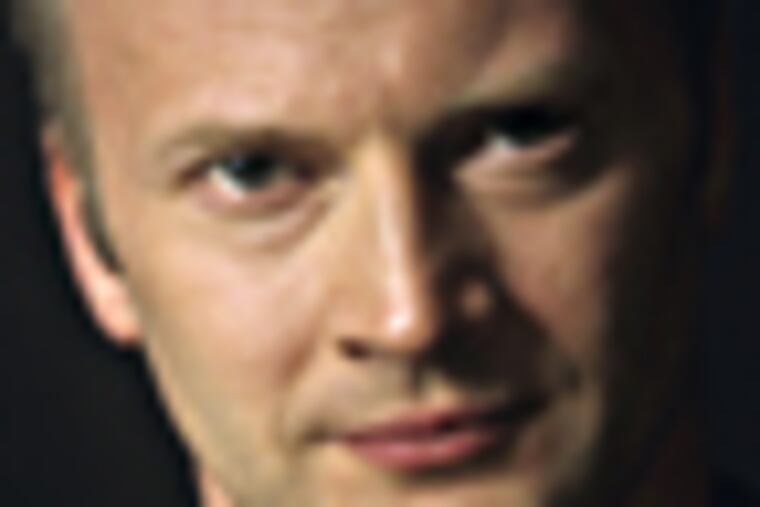Philly Orchestra and guest conductor: A match made in Rachmaninoff
Sometimes, the Philadelphia Orchestra needs an outsider to remind it of who it is and what it was. Gianandrea Noseda - a guest conductor so popular with the orchestra that he was reengaged for a two-week stint this season starting Thursday (with other return visits in the works) - happens to be the foremost Rachmaninoff specialist of his generation.

Sometimes, the Philadelphia Orchestra needs an outsider to remind it of who it is and what it was.
Gianandrea Noseda - a guest conductor so popular with the orchestra that he was reengaged for a two-week stint this season starting Thursday (with other return visits in the works) - happens to be the foremost Rachmaninoff specialist of his generation.
This week, he's conducting that composer's Symphony No. 2 Thursday through Saturday at the Kimmel Center with what is generally considered to be "Rachmaninoff's orchestra." In fact, when the Philadelphians play Rachmaninoff in Europe, it's considered an "authentic-instrument" performance.
Nonetheless, all orchestras morph over time.
"He has in his ear what the Philadelphia Sound should be, and he's encouraging us to do that," said longtime cellist Richard Harlow, who played the symphony under Rachmaninoff's trusted collaborator Eugene Ormandy. "We kind of forget these things. We need to be reminded to make a smooth bow change. ..."
And not to play everything so loud, as did the venerable Ormandy.
Noseda rushes to Ormandy's defense. "He was performing not here, but at the Academy, where the acoustics are so dry ... and you need to have the orchestra play louder ... with incredible vibrato and sustained sound," said the tall, elegant Noseda. "But if you respect very carefully the dynamics that Rachmaninoff wrote, the piece immediately becomes more three-dimensional."
Though the orchestra no longer has a living memory of Rachmaninoff (who died in 1943), Noseda hears that composer's distinctively Russian manner in the Philadelphia DNA. And to that he brings a comprehensive view of the composer's output.
Though the symphonies and piano concertos are often performed, Noseda has conducted Rachmaninoff's choral works and little-known operas. He spent eight years working under conductor Valery Gergiev at the Mariinsky Theater in St. Petersburg, Russia, where he interviewed several people who knew Rachmaninoff, including the composer's grandson.
The resulting viewpoint of Rachmaninoff unfolded on several fronts at Tuesday's Philadelphia rehearsal. For all of the music's swooning romanticism, Noseda reminded the orchestra that Rachmaninoff, though born in 1873 and a product of pre-communist Russia, was a modern man - among the first in his country to own an automobile.
Musically, his methods of construction are quite in step with more blatantly modern contemporaries such as Stravinsky and Shostakovich. "With just a few notes, he could just develop and explore, and make the music bigger and bigger," says Noseda. "Now, we give Rachmaninoff the right place in 20th century music. It's not a Hollywood style, but music of a deeply honest man."
Noseda's connection with Rachmaninoff's Old World/New World dichotomy has significant parallels in his own life. His claims to modernity include a seismic event in 21st-century recording technology. In 2005, his BBC Philharmonic recordings of Beethoven symphonies were offered for free on the web, prompting 1.5 million downloads from as far away as Mongolia.
Yet Noseda, who is as outgoing as any conductor on the landscape, has been termed a "recluse" by the British media because he refuses to own a cellphone. Not that he dislikes communication. He just has a terrible time with technology.
In an era of young conductors' landing major orchestras soon into their careers, Noseda, 48, has held back - without envy. The Milanese was a credible working pianist throughout his 20s, started taking conducting lessons, and won two competitions that set him on his way.
His long apprenticeship under Gergiev was just fine with him. He held a number of principal guest conducting positions before taking the BBC Philharmonic in 2001 in Manchester, which came with a large electronic platform, including a sizable Chandos recording contract. Now, his only big position is Teatro Regio di Torino - in another underdog city, Turin, Italy - along with blue-chip guest conducting at the Metropolitan Opera and the Philadelphia Orchestra.
His guest status, he believes, is a good way to hone repertoire without the weighty responsibility of running an institution. "By the time you arrive as a chief conductor, you should have something to say. Otherwise, it's like a love affair for one night," he says. "When the players get to the point where they immediately know what you're going to ask, it's not good.
"The important thing about it is to have a very clear idea of the sound you want to achieve and find a way through the hands and the heart to get it," he says. "You can imagine an ideal world in music using skills and talents of other people, and also make the music as an experience in society. So your ego is going to disappear sooner or later."
What? No ego? Might Noseda be cut from different cloth than his autocratic Italian elders such as Arturo Toscanini, Guido Cantelli, and Riccardo Muti? "I'm not less demanding," he says. "If I don't get what I want, I try in a different way."
That mission would seem to be accomplished in Philadelphia. After rehearsal, musicians went out of their way to give him compliments. The sentiments are mutual. "I like them," Noseda says. "Enormously."